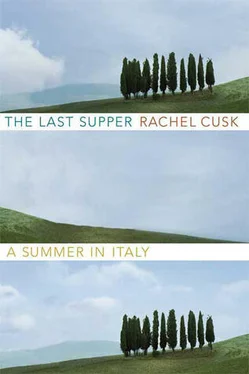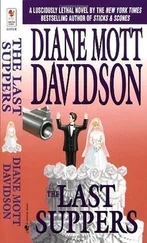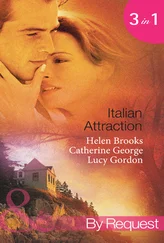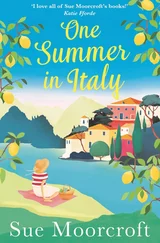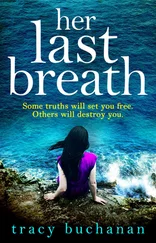Later I hear the American girls talking about their mother. She’s really sick, the older one says. I sit up: I want to explain to my daughters what that means. I want them to be kind. They are sitting in a row on the shoreline in their swimming costumes. Sometimes a wave comes up and foams at their feet. They are tossing pebbles into the water. I buy them an ice cream. I leave them be.
At Ventimiglia, near the French border, we turn off the coast road and drive up into the hills. We are looking for somewhere to pitch Tiziana’s tent. It is six o’clock, still hot. The countryside is a little ragged, scarred here and there with enterprise, and with the formlessness of frontier places where the feeling of identity comes in unpredictable surges and then frays again, like an unraveling hem. The road goes up and up. We pass parked lorries and derelict roadside restaurants, travel through villages that cling along the verges and then peter out. The irresolute green vista resumes hesitantly, after each pause. We reach Dolceacqua and the broad brown Nervia River. There is a feeling here of civilization and abandonment, of something dead that was once alive: the ruined castle on its hill, the ancient arc of the great stone bridge, the tall, narrow, ravaged-looking terraces. Everywhere there are vineyards, modernized, bristling with signs. We stop and ask the way to the campsite, and are directed on ahead.
At last the campsite appears, a modest roadside place in its obscurity of low hills, where nonetheless there are people, established in their dusty pitches beneath the trees as though they had lived there all their lives. There are some mobile homes, where washing hangs on lines and television sets flicker through the windows. There are Dutch tents and German tents and tiny podlike tents with bicycles parked outside. There is a little bar and a café, and next to that a small rectangular swimming pool. The sky is overcast and gray: the dingy pool is full of children, whose parents sit in white plastic chairs on the concrete tiles. It is slightly desolate, this arrangement, though everyone seems to accept it. The countryside extends indifferently around; the sky is moody overhead; the parents lie torpid in their chairs, or rouse themselves to sudden, startling fits of activity, plunging heavily in and hurling their offspring shrieking across the water. Shortly after we arrive, everyone abandons the swimming pool and returns to their tents. It is no longer hot, but we will swim in any case. In the traffic jams of Ventimiglia, where we crawled through the dusty, constricted streets of the città vecchia behind giant lorries bound for Nice and Marseilles, the sun was cruel and adversarial, faintly humiliating: it was a form of oppression, from which swimming offered the only possibility of liberation. But we could find no road down to the sea at Ventimiglia, and in the end the heat passed, undefied. We defy it now, in retrospect, circulating around the cloudy water where children’s blow-up toys drift, forgotten, across the surface beneath the gray sky. Desire and satisfaction have become uncoupled. There will be no consummation tonight. There will be no resolution, no declaration of the day’s victory, no enshrining of its significance. We have reentered the other reality. We have returned to the ordinary, unexamined experience of life.
We pitch our tent on a dirt terrace in the trees, between two other tents. Everything is silent. People walk to and fro, commuting to the sinks and the shower block. Their flip-flops slap against the soles of their feet as they pass. They carry wash bags, dirty dishes, boxes of detergent. They glance at us beside our tent. When we ourselves walk to the shower block, the people by their tents glance at us. It has grown dark, though we were not aware of the sun setting. The light drained unremarked from the wadded sky with its screen of hills, and left behind an arid darkness. We go to the bar, which is empty. After a while a man comes through, and we ask if there is anything to eat. He thinks there is not. He says that he will go and talk to his wife. The wife appears: they are not serving food, but she has cooked spaghetti alla bolognese for herself and her husband. If we think that will be satisfactory, then we are welcome to share it. She will serve it on the terrace by the swimming pool, with a bottle of wine from their vineyard.
We go out and sit on the terrace. There is no one there. The sky is full of stars. The pool is inky, inchoate, flecked with silver. It has soothed us, this encounter with the man and his wife, but it has aroused our emotions too. It has awoken our love for Italy just as we had entered the gray prospect of leaving it. We are nervous, a little shaky. We discuss our plans, the two nights that remain after this one before we catch the boat. I want to stay here, on this side of the border. I don’t care what the campsite is like. I don’t want to leave. The children run around in the dark. The woman brings our food in a big silver covered dish. She is worried it will not be enough, but when she takes off the cover we see that there is almost more than we can eat. Later the husband comes out to see how we are getting on, and when we praise the spaghetti he becomes eloquent, descanting gently in the starlight on the glories of his wife’s cooking as he clears the plates. This was our last supper: it was difficult to recognize it, to understand it, until it was complete. We go to our tent, and lie listening to dogs barking somewhere in the valley.
The next day we find ourselves in Dolceacqua, wandering aimlessly through its dark viscera of alleyways, where tiny doors lead up to dwellings of unimaginable exigence and dilapidation. In the sloping, deserted, pockmarked piazza the church bell is tolling. Through an open window high up in a crevice-like street I hear someone playing a song by The Cure. The river runs between its dry, dusty banks. We climb up to the ruined castle and stare into its blackened interior. Coming down, we take the wrong path and find ourselves in a car park surrounded by wire fences. It is too hot to go back up. We pass through a gap in the fence and down a steep, narrow stairway that twists and twists across a derelict, litter-strewn hillside. It leads to a kind of catacomb beneath the village, a dank network of tunnels and passages where we stoop beneath the low ceilings, searching for a way out. Suddenly we are tired of being here. Here is where we neither want nor have to be. It is one or the other, duty or desire, freedom or responsibility. That is the pendulum swing, the inescapable arc of life. But this place we have the power to leave.
We go back and pack up the tent. The pool is full of children again. Their parents sit prostrated in their white plastic chairs. There is the sound of splashing water, and of people calling to one another in German. At four o’clock we are on the road down to Ventimiglia. We take the exit to Nice, fly through a checkpoint where a traffic policeman in a beautiful uniform waves us on with his white gloves, and enter a tunnel that passes straight through a hillside into France. We come out, blinking, in the bleached light of the Côte d’Azur. It is strange, that the violence of leaving Italy should occur without sensation. It was a single blow, swift and numbing, virtually painless. But when we stop to get petrol and water outside Nice, I feel a nameless sense of bereavement. The French words are uncomfortable in my mouth. The girl behind the till is busy, distracted, sullen. I stand before her; I feel that I have something in my hands, something large and shimmering and important, something I am aching to give. There are people behind me in the queue. They are impatient; this is a big place on a hot motorway where needs are processed without sentiment. But sentiment is what I require; I require feeling, acknowledgment, kindness. I ask whether they sell road maps — we have lost ours. She doesn’t hear me, so I ask again. This time she understands. She is incredulous, disgusted: it is outrageous, that I have asked her such a question. It is as if I have robbed her of something. I am struck by the economy of her outrage. It takes a second, no more. She points to the shelves. Go and look, she says.
Читать дальше
